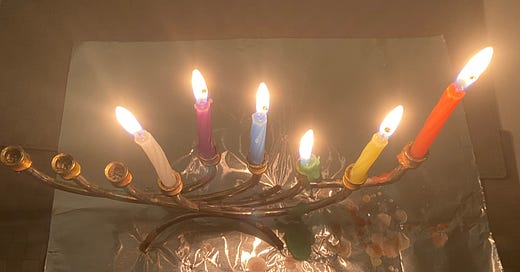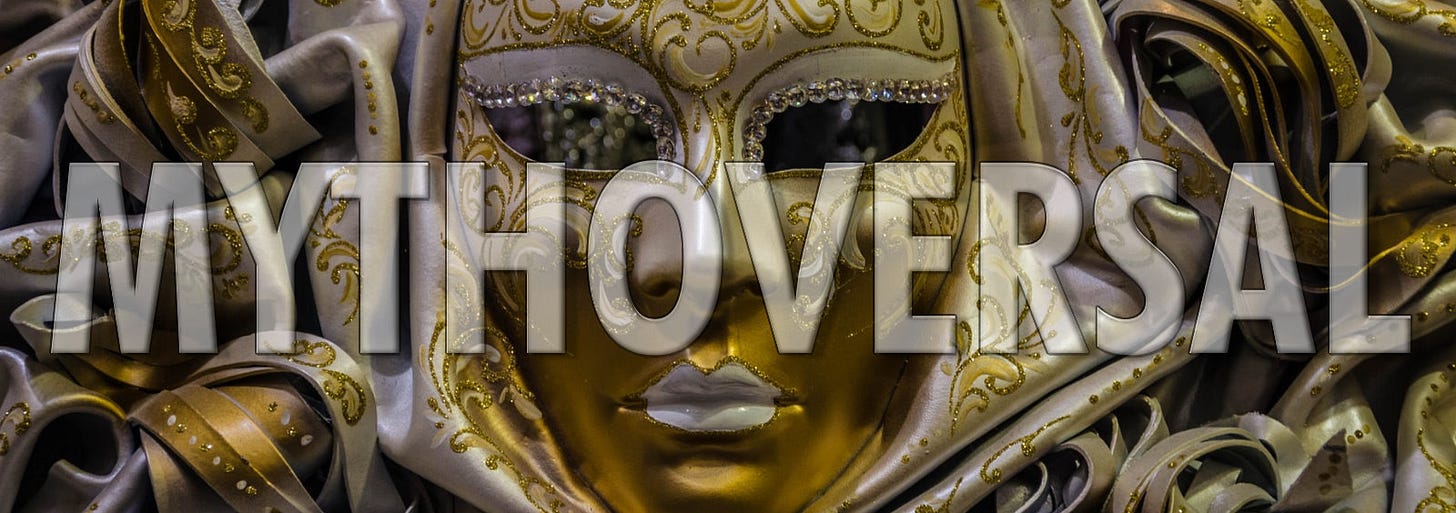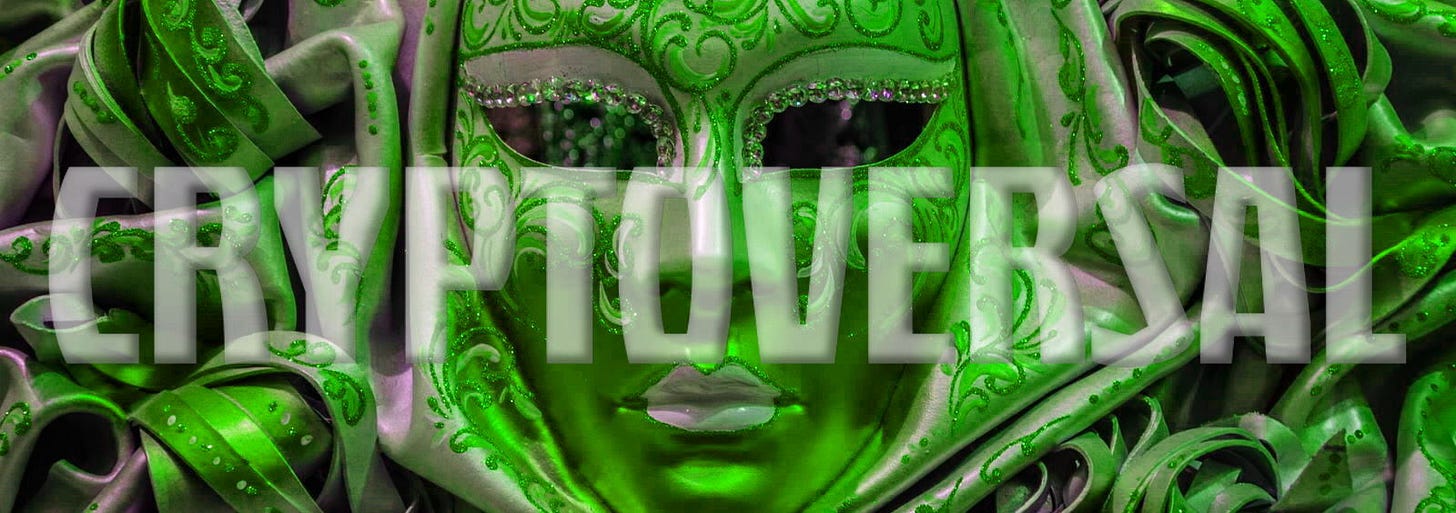Welcome new subscribers to the free edition of the Mythoversal Newsletter, and welcome back to longtime readers. Read on for an essay on the Ḥanukkah Miracle and an announcement about my latest project.
I wrote about the Thanksgiving story in the last newsletter, and the holiday theme continues into December. At this time of year, people in the Northern Hemisphere experience progressively shorter days and longer nights leading up to the Winter Solstice. Holidays in this season use lights to symbolically resist the encroaching darkness, whether it’s the light of a bonfire, a star, or the flame on a holy altar.
The holiday my family celebrates in this season is spelled at least a dozen ways in English, with “Ḥanukkah” being the classical transliteration.
Ḥanukkah commemorates the capture of Jerusalem and rededication of the Second Temple in 164 BCE, during the Maccabean Revolt against the Seleucids. Although the story is based on a historical event, it’s been mythologized to fit better into the theme common to several Jewish holidays: “They tried to kill us. We survived. Let’s eat.”
Except…
This time, they weren’t intent on actually killing us. They were merely out to commit a cultural genocide by absorbing us into the dominant Hellenic culture that Alexander the Great had spread across the region. They left the people alive while banning their scriptures and religious practices.
Except…they who?
The uncomfortable fact that’s been removed from the mythologized version we tell over sufganiyot and potato latkes is that the Seleucid king, Antiochus IV, was invited into Jerusalem by a group of Hellenized Jews. The historical detail we gloss over is that “they” weren’t an invading or occupying force at all.
This time, “they” were us.
The Ḥanukkah myth eludes political infighting and an agonizing civil war to focus instead on a singular moment of joy and optimism. In this peri-Solstice holiday, the light that resists the encroaching darkness is the flame of the newly reconsecrated temple. The source of drama and tension in the myth isn’t politics or war, but the staying power of a single jar of olive oil.
Here is one version of the Ḥanukkah myth:
It was a time of turmoil in the Land of Judea. The Seleucids had taken over and were intent on wiping out all traces of the traditional faith. The Seleucids banned Torah study, destroyed scrolls and religious artifacts, outlawed prayer ceremonies, and turned God’s Temple into a shrine for Zeus.
Worship of the Greek pantheon was mandated. Some people still followed their true faith in private, but always under threat of severe punishment if they were discovered. Some carried spinning tops called dreidels in case their study sessions or prayer meetings were raided by the authorities, because under the brutal Seleucid regime, gambling was acceptable while expressions of Judaism were punishable by death.
A group of brothers, the Maccabees, led a revolt against the Seleucids in the name of religious freedom, seeking to preserve their traditions and right to worship as they saw fit. Poorly armed and battling against all odds, the Maccabees liberated the Holy City and took control of the desecrated temple.
A great deal of work was required to convert the structure from a pagan shrine back into a site holy to God. The final and most important task was to light the Menorah and keep it burning. But as hard as the Maccabees searched, they could only find one day’s worth of consecrated oil, while eight days would pass before a new supply could be obtained.
The Maccabees lit the lamp.
The people drew close, cheered by the sight of the flame for the first time in years. There was much happiness, but also some dread at the certainty that the light would burn itself out at the end of the day. And yet, somehow, the flame burned on into its second day. Then into a third. Then into a fourth.
The light increased. The crowd increased. The joy and celebration increased as the week continued, until the eighth day arrived with the flame still sputtering as its new fuel was added. The Maccabees still had much work to do in securing the rest of the land, but the faith of the people had been rekindled, and the inner light of their hearts could never afterward be extinguished.
If myths are the stories a culture tells itself about itself, then what is this one meant to convey? One thing that gets me about the Ḥanukkah story is that its miracle would not have been recognized as a miracle while it was happening.
A fuel resource lasting longer than expected isn’t a miracle. The Temple’s eternal light wasn’t supposed to go out even for a moment, so a day’s worth of oil providing a two-, three-, or seven-day flame would have been no more useful than a one-day flame. It wouldn’t have been until the very end of the eighth day that anyone at the time would have known for sure that this flame would last as long as it was needed. Only after the fact could the flame have been recognized as miraculous.
The Ḥanukkah story shows little interest in the civil war raging through the land. Instead it asks, if a miracle happened to us, would we even realize it? And the suggestion it makes is that we possibly would not. Miracles may be happening all around us but, like the Maccabees on Day One of the First Ḥanukkah, we lack the perspective to see anything out of the ordinary.
The Ḥanukkah story also suggests that as rational actors, humans may be unknowingly eliminating potential miracles from their lives. Logically, rationally, reasonably, the Maccabees should not have lit their meager supply of oil on the first day. They knew how much oil they had on hand, how long it was expected to last, and how long it would take to secure a new supply. They should have held off until day eight to ensure that the rededication of the Temple would take. They could have rationalized that the real miracle was that they’d captured Jerusalem at all. They could have told themselves that if God had meant for the flame to last eight days, He would have provided eight days’ worth of oil.
Yet had the Maccabees acted rationally, there would have been no Ḥanukkah miracle. Luckily for the makers of nine-branched candelabras, the Maccabees’ faith allowed the space and time for a miracle to occur.
I like to believe that this lesson extends beyond Ḥanukkah and beyond Judaism to all people and all times. Our human capacity to open our minds to the unexpected is what determines the existence of miracles, magic, or moments of wonder in our lives.
Wherever you find your light in this season of long nights, I wish you a season of miracles, magic, and mythology.
—Greg R. Fishbone, Mythology Disruptor
As always, Mythoversal brings inclusion to Greek mythology by broadening representation, amplifying marginalized identities, and reversing centuries of gatekeeping and erasure. The site is the launchpad for my Becoming Hercules serial on Kindle Vella and various other mythic retellings.
This month I’m pleased to share the soft-launch of a new project I’ve been working on in the NFT space. Cryptoversal is a publisher of NFT books and blockchain blockbusters, debuting with the "Mad Messages" Collection of 32 unlockable book chapters minted to the eco-friendly Polygon sidechain. Together, these limited-edition NFTs reveal the unpublished third novel in my Galaxy Games series (which is also being serialized on Kindle Vella).
You’ll find more information about this project on my author website.
You may also like some of the free ebooks in this promotion from BookFunnel:








